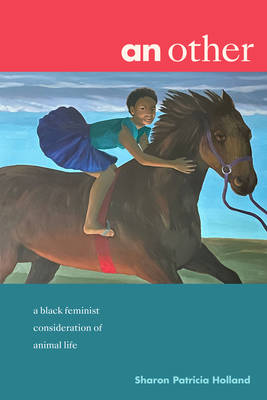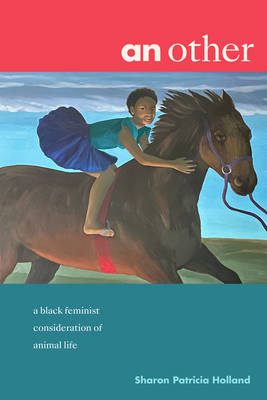
Door een staking bij bpost kan je online bestelling op dit moment iets langer onderweg zijn dan voorzien. Dringend iets nodig? Onze winkels ontvangen jou met open armen!
- Afhalen na 1 uur in een winkel met voorraad
- Gratis thuislevering in België vanaf € 30
- Ruim aanbod met 7 miljoen producten
Door een staking bij bpost kan je online bestelling op dit moment iets langer onderweg zijn dan voorzien. Dringend iets nodig? Onze winkels ontvangen jou met open armen!
- Afhalen na 1 uur in een winkel met voorraad
- Gratis thuislevering in België vanaf € 30
- Ruim aanbod met 7 miljoen producten
Zoeken
€ 48,45
+ 96 punten
Uitvoering
Omschrijving
In an other, Sharon Patricia Holland offers a new theorization of the human animal/divide by shifting focus from distinction toward relation in ways that acknowledge that humans are also animals. Holland centers ethical commitments over ontological concerns to spotlight those moments when Black people ethically relate with animals. Drawing on writers and thinkers ranging from Hortense Spillers, Sara Ahmed, Toni Morrison, and C. E. Morgan to Jane Bennett, Jacques Derrida, and Donna Haraway, Holland decenters the human in Black feminist thought to interrogate blackness, insurgence, flesh, and femaleness. She examines MOVE's incarnation as an animal liberation group; uses sovereignty in Morrison's A Mercy to understand blackness, indigeneity, and the animal; analyzes Charles Burnett's films as commentaries on the place of animals in Black life; and shows how equestrian novels address Black and animal life in ways that rehearse the practices of the slavocracy. By focusing on doing rather than being, Holland demonstrates that Black life is not solely likened to animal life; it is relational and world-forming with animal lives.
Specificaties
Betrokkenen
- Auteur(s):
- Uitgeverij:
Inhoud
- Aantal bladzijden:
- 344
- Taal:
- Engels
- Reeks:
Eigenschappen
- Productcode (EAN):
- 9781478025078
- Verschijningsdatum:
- 15/08/2023
- Uitvoering:
- Paperback
- Formaat:
- Trade paperback (VS)
- Afmetingen:
- 152 mm x 229 mm
- Gewicht:
- 458 g

Alleen bij Standaard Boekhandel
+ 96 punten op je klantenkaart van Standaard Boekhandel
Beoordelingen
We publiceren alleen reviews die voldoen aan de voorwaarden voor reviews. Bekijk onze voorwaarden voor reviews.











